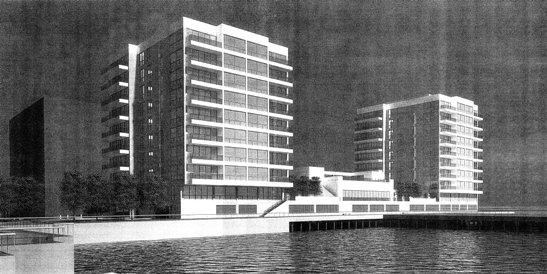February 9, 2013
The controversial proposal by Shipyard Associates to build two high-rise towers on a Hoboken pier just became more controversial. Based on the newly released FEMA flood maps, the project is situated squarely in the Coastal High Hazard “V” Zone and thus subject to design standards that will allow the towers to withstand waves having a height of 3 feet or more. The bottom of the lowest horizontal member of the structure should be installed above the base flood elevation that corresponds to the 100-year flood. At this site that would put the lowest floor above elevation 16 feet. The building should employ an “open foundation,” meaning that there are no obstructions so that water and debris can move freely underneath the building.
In New York, Governor Cuomo is proposing to spend $400 million to acquire coastal lands, thus leaving these properties undeveloped to avoid the hazard and cost of future storms. New Jersey’s Governor Christie has declined to institute a similar program for New Jersey’s battered shoreline. But coastal states need to rethink their building policies along their shores and New Jersey’s current policy allowing non-water dependent residential development on piers, over the Hudson River is ripe for change, given the lessons of super-storm Sandy.
The previous controversy surrounding the Monarch project centers around the developers 1997 agreement to build this site as open space. Since this high-rise proposal attempts to undermine this previous legal contract, the City of Hoboken filed a lawsuit to enforce the agreement. Last month, the Hudson County Superior Court Judge Arre consolidated the multiple appeals and lawsuits involved in this case. In December 2012, the Judge granted motions to intervene by the Fund for a Better Waterfront and the Hudson Tea Building Condo Association.
The battle over the Monarch Towers has involved challenges to the State of New Jersey’s waterfront permit, a denial by the Hudson County Planning Board and then another denial by the Hoboken Planning Board. Developers Michael and David Barry principals of the Shipyard Associates continue to press ahead despite opposition from Hoboken’s Mayor Dawn Zimmer, the entire Hoboken City Council, the Fund for a Better Waterfront and neighboring residents.
The original Judge, Barry Sarkisian has recused himself from the City of Hoboken v. Shipyard Assocs. case due to a conflict of interest. Although he has sat on this case from the beginning, it came to light that he had formerly provided legal representation to the development company prior to being appointed to the bench.

Rendering of Monarch towers at Weehawken Cove.
In 1997, the Hoboken Planning Board granted approval to the Shipyard Associates to build 1160 residential units at the northeast corner of Hoboken, a prime piece of waterfront real estate. Last year, the developers completed the final units of this project and then submitted an application to build 78 additional units in two high-rise towers on a pier at the north end of their project. The original approvals for this planned unit development (PUD) in 1997 designated this pier as open space.
The City of Hoboken, represented by the law firm Maraziti, Falcon & Healey of Short Hills, New Jersey, charges breach of contract and seeks a declaratory judgment upholding the 1997 agreement. In 2011, the Monarch project obtained a waterfront permit from the New Jersey Department of Environmental Protection (NJDEP) to build the towers. FBW, the City of Hoboken, and the Hudson Tea Building all filed appeals of the permit decision and have been waiting for over a year for the state’s Office of Administrative Law to grant a hearing.
Related links
79% of Hoboken falls into FEMA’s new flood zone!
FBW letter brief 9-14-2012
Two strikes on Monarch towers
Freeholders counsel rejects Monarch appeal
City sues Monarch developers for breach of contract
County Planning Board stuns Monarch developers with “no” vote
Can the waterfront walkway be a “street”?
FBW challenges state approval for towers on Hoboken pier
DEP flouts its permit to restore pier as open space
Shipyard’s plan to privatize pier

